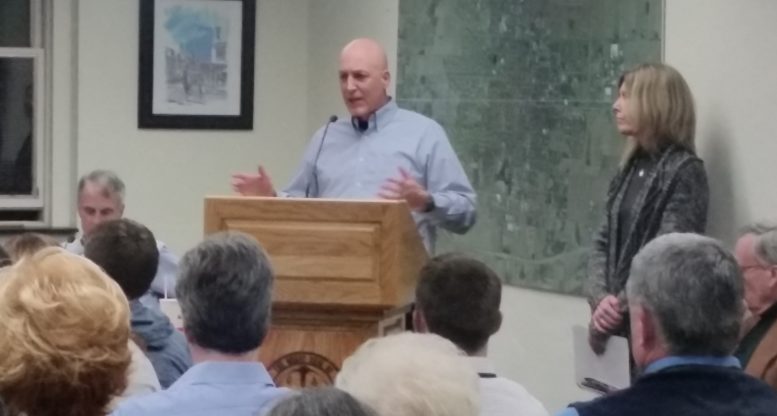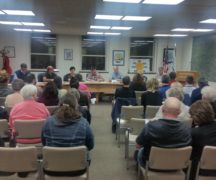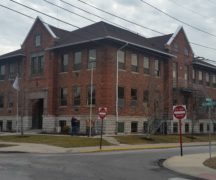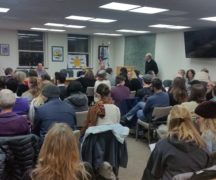(Submitted by Lisa Kochheiser of UC4Power)
The grassroots Bowling Green/Waterville organization United Citizens for Protecting Our Water and Elevating Rights (UC4POWER) has filed a new scientific report (attached) with the Federal Energy Regulatory Commission in the NEXUS pipeline licensing case which forewarns of a serious chance of an earthquake from constructing the pipeline.
In its March 27 FERC filing, UC4POWER’s expert witness, Dr. Andrew Kear, a hydrogeologist and professor of environmental policy at Bowling Green State University, warned of a “1.7 to 4.4 magnitude human- triggered earthquake” at the Waterville site where NEXUS, a natural gas megapipline, is planned to intersect the Bowling Green Fault and cross underneath the Maumee River riverbed. The Bowling Green Fault is a 100-mile-long crack in the Earth’s crust extending from southeastern Michigan southward through Waterville and Bowling Green to the Findlay area. Dr. Kear finds the risk of human-induced earthquakes at the Nexus Maumee River crossing to be perpetual. The region could be faced with a catastrophic explosion if an earthquake occurs once the pipeline is in the ground.
Independent from the possibility of an earthquake, Dr. Kear also projects that millions of gallons of lubricating fluid planned for drilling the 4,000 foot tunnel for NEXUS will disappear into the Fault and the area’s well-known system of fractured rock and contaminate water in unpredictable places which could easily include up-river of the BG facility’s water intake.
Additionally, UC4POWER activists worry that the City of Bowling Green’s water intake facility and above-ground reservoir on the Wood County side of the river across from Waterville could be damaged in the event of a human-induced earthquake from pipeline construction. The group has sought since a February 1 filing to have FERC order an extensive study of seismic and water pollution threats listed by Dr. Kear.
According to the group, NEXUS and the FERC staff failed to identify and evaluate risks associated with the plan to drill, blast, and ream a tunnel underneath the Maumee River through bad geologic conditions, using a process of drilling which NEXUS’ own consultants consider to be “high risk.” There has been no formal consideration of the implications of these potential combined effects by FERC.
“NEXUS failed to acknowledge/analyze its own contractor’s ‘high risk’ assessment of constructing a tunnel underneath the Maumee for the pipeline,” noted Lisa Kochheiser, convenor of UC4POWER. “NEXUS never even identified the existence of the Bowling Green water treatment plant. Through the ‘politics of erasure’ this regional water source hasn’t been properly evaluated as being at risk from the pipeline project even though it stands only 800 feet away from the spot where the pipeline will cross the Bowling Green Fault.”
NEXUS plans to use a high-impact process to tunnel underneath the Maumee River called Horizontal Directional Drilling (HDD). The HDD part of the project will take roughly 100 days of drilling and will blast 12,000,000 to 24,000,000 gallons of drilling fluids through poor geologic conditions next to the municipal water supply, and near an active blasting quarry on the western edge of the City of Waterville. These interactive risks have not been noted nor considered by FERC, as required by law. Dr. Kear has determined that during horizontal drilling operations, drilling fluids will likely enter the fractures, lubricate the Bowling Green Fault, and could potentially induce earthquakes. Even if earthquakes do not occur, the loss of drilling fluids to the fractures and potential karst features in the subsurface risks contamination of aquifers and the Maumee River, a complication which also has not been noted or assessed by FERC in its environmental study.
NEXUS Gas Transmission, LLC intends to build the pipeline through the Bowling Green Fault zone anyway, and opposes the claim that further study is warranted. The company says the public cannot make such a request now because it would disrupt the project’s construction timetable.
“UC4POWER is made up of concerned people from Bowling Green, BGSU, and Waterville, a group of communities that suddenly finds that they are caught in the crosshairs of a bad corporate plan and a captured agency,” stated Kochheiser.




